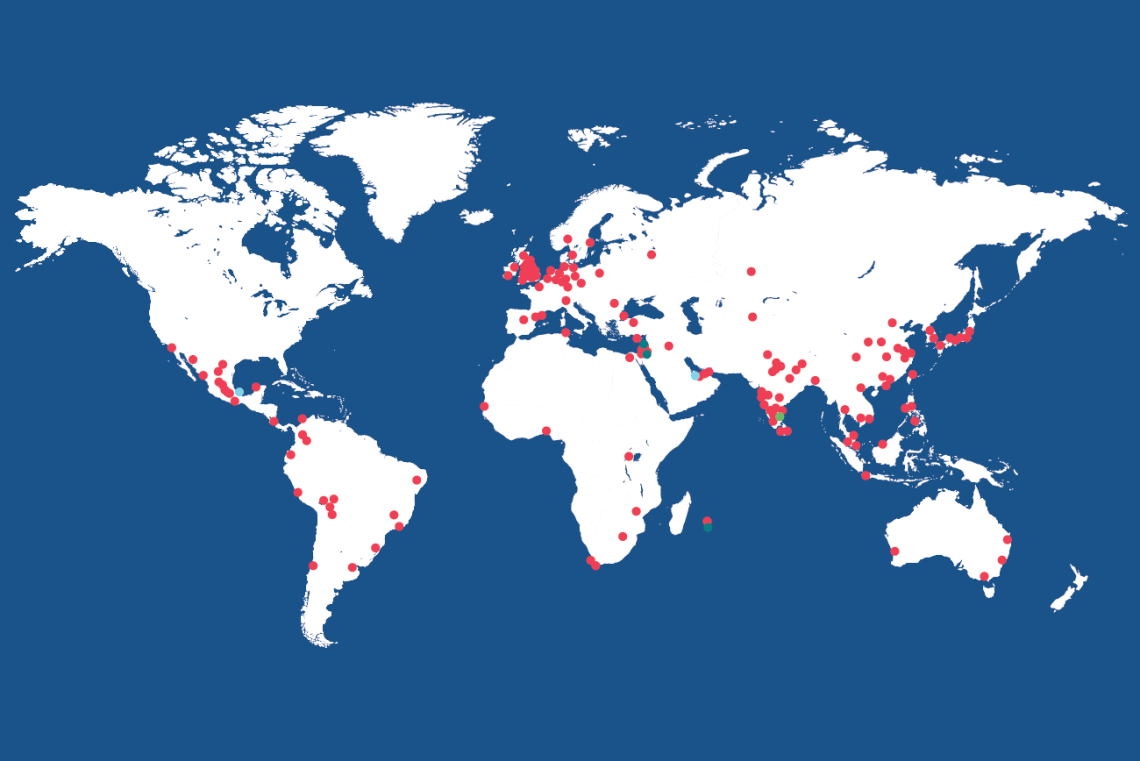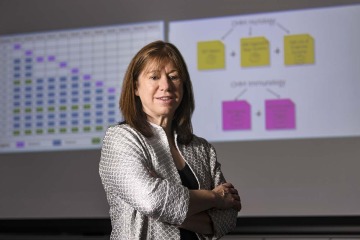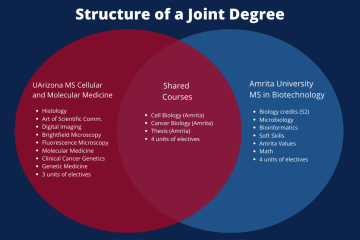Educational, Research Opportunities Expand Internationally
A new international partnership with Amrita University in India is educating students to solve pressing health care issues around the world.

At least half of the world’s population cannot obtain essential health services, and it will take an additional 18 million health workers in low and lower-middle income countries to achieve the World Health Organization’s goal of universal health care by 2030. Solving global health issues is a priority at the University of Arizona Health Sciences, where the next generation of health professionals are being trained through advanced educational programs around the world.

Carol Gregorio, PhD, is overseeing UArizona Health Sciences International, an initiative to create international partnerships to educate students around the world using highly adaptable curriculum and research exchange programs.
“The goal of the International initiative at UArizona Health Sciences is to build a truly interprofessional research and education program that we can offer not only to our students at the university, but also to students across the country and around the world,” said Carol Gregorio, PhD, assistant vice provost of Health Science Global Affairs. “We're working toward this goal by building very flexible programs that can really be focused on the needs of the student.”
Working in tandem with Arizona International, Health Sciences International leverages the university’s existing international infrastructure and microcampus network to build partnerships with universities in other countries. In fall 2020, Health Sciences International launched a dual-degree master’s program in cellular and molecular medicine with the UArizona College of Medicine – Tucson and Amrita Vishwa Vidyapeetham University in India.
An education for global careers
Nishtha Desai, of Surat, Gujarat, India, is one of 30 students in the new program. Amrita students who are considering one of seven master’s degrees from Amrita University’s School of Biotechnology or Center for Nanosciences and Molecular Medicine can apply to the UArizona program and earn a dual degree in cellular and molecular medicine from the College of Medicine – Tucson.
Desai is studying biotechnology and, like many Amrita students, is planning a career in research.

Nishtha Desai is one of 30 students in the first dual degree program through Health Sciences International and Amrita University in India.
“I really have a burning desire to indulge myself in cutting edge-research, particularly in stem cell biology and genetic engineering,” Desai said. “And the science of regeneration has always fascinated me, particularly when it comes to such times when the world is facing many diseases.”
David Bear, PhD, professor of cellular and molecular medicine at the UArizona College of Medicine – Tucson, taught foundational courses in genetic and molecular medicine for Amrita students last fall. Desai’s goals and global outlook are representative of many Amrita students. While many U.S. students use a cellular and molecular medicine degree as a pathway to medical school, at Amrita, students tend to focus on careers in research with the goal of finding solutions to global health care issues.
“The Amrita students are coming into this program with a whole set of challenges and experiences in health care and public health that most students from highly developed countries just don't have,” Dr. Bear said. “They are sensitive to a lot of issues experienced by those in third-world countries that need to be solved by science and technology. These are students who are looking at education and research not just as an intellectual pursuit, but as a way to make their own society better and perhaps help develop their country more,” Dr. Bear added. “These students are after more than a grade.”
The program was structured to benefit all students, whether they are pursuing clinical or research careers. It is also highly adaptable to different regions of the world and prepares students to expand their horizons through research exchange programs that will be developed in the future.

The dual degree program through UArizona Health Sciences and Amrita University offers flexible curricula that can be tailored to each student’s degree path and career goals.
As the spring semester comes to an end, students are finishing a class in histology, which is a subject Amrita University does not offer. The study of the structure of cells and tissues serves as a valuable bridge between the life sciences and the biotechnological enterprise industry, making students more well-rounded in the sciences.
“The degrees are a very good combination and will add a lot of value while applying for my PhD and for getting a position in biomedical research,” Desai said. “I see it as a great platform to build my future career.”
Dr. Gregorio shares Desai’s excitement and hopes for the future. The cellular and molecular medicine dual-degree program is the first of many Dr. Gregorio plans to develop involving all of the Health Sciences colleges.
“Our degree programs provide a fantastic opportunity for students to pursue their educational goals. I believe they will give students a chance at better jobs and research opportunities,” Dr. Gregorio said. “This is a dream for most of these students. And it feels really good to be part of that dream and to make it happen.”

